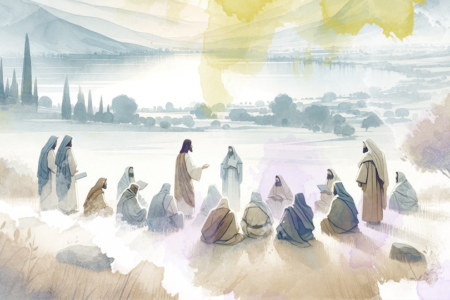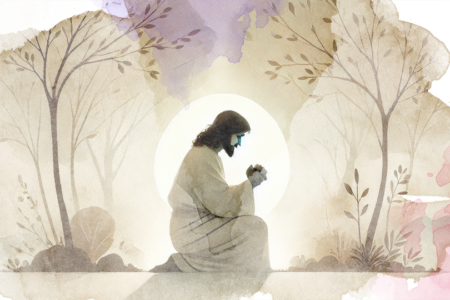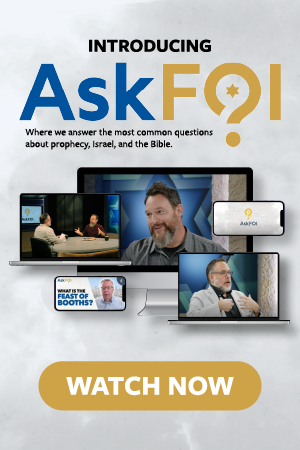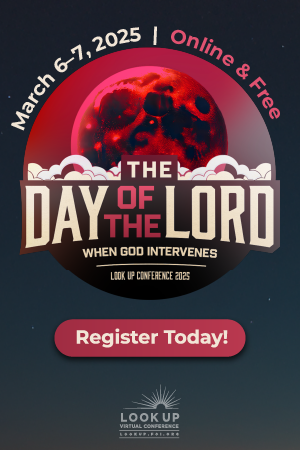“Rabbi, What Do You Believe Concerning The Messiah?”
Many Christians ask, “What do rabbis believe concerning the Messiah?” It would be easy to answer this question, but I thought you might be interested in hearing the answer from a Conservative rabbi.
While teaching a class on Israel at Moody Bible Institute, I assigned my students a project. They were to interview a rabbi concerning his beliefs on the Messiah. I would like to share one of those interviews with you, and then compare the rabbi’s answers with the biblical teaching on the Messiah.
QUESTION: Rabbi, do you believe in a supernatural Messiah who will bring peace to men spiritually and physically?
ANSWER: No! The process whereby God’s Kingdom would become a reality was viewed as being entirely within the realm of the human and natural. Isaiah foretold the birth of a descendant from the house of David who would be endowed with wisdom and courage to manage the affairs of the world. The earliest vision of a messianic era centered around “a shoot that shall come out of the house of Jesse.” Our people always thought of David as the faithful servant of God and the heroic champion of His people, as the noblest embodiment of the ideal ruler. Therefore, prayers for the coming Messiah often took the form of prayers for the restoration of the “house of David” and for the appearance of the “shoot of David.”
As centuries passed and Jewish suffering intensified, the messianic hope was greatly anticipated by many Jewish people. The Messiah was described as one who would have the power to destroy all evil doers, banish evil, and turn men to justice and love. He would gather Israel’s scattered exiles back to the promised land and reestablish a free Jewish state under His rule, blessing all men with universal peace and brotherhood.
QUESTION: Could Jesus be Israel’s promised Messiah ?
In no way could we accept Jesus as the promised Messiah! Jesus was just a Jewish man, a great teacher, who was arrested and killed by the Romans. Jesus was not supernatural, neither did He pre-exist. The concept of a supernatural Jesus as Messiah was developed by the writers of the New Testament who wanted to glorify Him as God.
QUESTION: Do you believe that Jesus could have fulfilled any of the Old Testament prophecies concerning the Messiah?
ANSWER: No! Jesus did not fulfill any of the Old Testament prophecies concerning the Messiah. Jesus is not “Mr. Special.” I love Jesus as I do all men. He was only a man, not God. The Old Testament does not teach that the Messiah is to be a Savior, but a ruler, or deliverer. I know the New Testament teaches that Jesus’ coming was to make atonement for man’s sin. But why did a man have to die for man’s sin? God could forgive men their sins simply by confessing them directly to Him. It is blasphemous to believe that a holy God would allow an innocent man to die for another man’s sin.
We do live in an unredeemed world, but God is accessible to all men and they do not need an intermediary. All who believe in God and live righteously have a share in the Kingdom of God.
QUESTION: Do you look for a Messiah to come?
ANSWER: Yes. When Messiah comes He will bring peace according to Isaiah 2:4. Today, many Jewish people pray for the coming of Messiah. Their prayers are symbolic of our faith and hopes over the centuries that the forces of God’s love and justice, working through men, would ultimately triumph in the affairs of mankind.
You have just read the traditional responses given by some rabbis to the questions dealing with the Messiah. Is the rabbi correct? Do his answers reflect the teaching of the Bible concerning the Messiah? Let us compare the rabbi’s answers with the biblical description of the Messiah.
1. The rabbi believed that Messiah would come from the house of David.
This is true! Messiah is to be from the “seed of David.” God promised unto David, “And thine house and thy kingdom shall be established forever before thee; thy throne shall be established forever” (2 Sam. 7:16). Again, “Behold, the days come, saith the Lord, that I will raise unto David a righteous Branch, and a King shall reign and prosper, and shall execute justice and righteousness in the earth” (Jer. 23:5).
The promised seed who will sit on David’s throne is fulfilled in Jesus the Messiah. The Bible clearly teaches this: “He (Messiah) . . . shall be called the Son of the Highest; and the Lord God shall give unto Him the throne of His father, David” (Luke 1:32). Jesus the Messiah is a physical descendant of David, whose seed can be traced back through Mary, and David’s son Nathan (Luke 3:31).
2. The rabbi believes that the concept of a supernatural Jesus was developed by the writers of the New Testament who wanted to glorify Him as God.
The rabbi is in error. The writers of the New Testament did not make Jesus a God, but simply reported the facts that they had witnessed. The prophecies of the Old Testament clearly set forth many things about the deity of Messiah which Jesus fulfilled and, humanly speaking, had no control over.
First, it would be impossible for the writers of the New Testament to forge the ancestry of Messiah. Jesus fulfilled all of the Old Testament prophecies in this area. For example:
- Messiah is born of David’s seed – 2 Sam. 7:12-16; cf. Luke 1:32
- Messiah is born of Judah’s tribe – Gen. 49:10; cf. Heb. 7:14
- Messiah is born of a virgin – Isa. 7:14; cf. Matt. 1:18-23
- Messiah is born in Bethlehem – Micah 5:2; cf. Matt. 2:1
- Messiah is born at a specific time – Dan. 9:25; cf. Gal. 4:4
Secondly, Messiah’s death by piercing was predicted 1,000 years before it took place in Psalm 22, and 700 years before in Isaiah 53. Jesus’ crucifixion literally fulfilled the description of Messiah’s death as seen in Psalm 22 and Isaiah 53. Thus, the New Testament writers simply recorded what they had seen and heard. It would have been impossible for them to forge such a well-known historical fact as the crucifixion to make it look like Jesus was fulfilling the Old Testament prophecies.
Thirdly, the Old Testament prophesied the resurrection of the Messiah in Psalm 16:10. The accounts in the Gospels by eyewitnesses assure us that Jesus was actually resurrected from the dead. During the forty days between His resurrection and ascension, Jesus appeared to His followers on ten separate occasions (i.e. Matt. 28:8-10; Luke 24:13-32; John 20:11-25; 1 Cor. 15:6).
Peter also states that David believed Psalm 16:10 referred to the Messiah’s resurrection:
Therefore, being a prophet, and knowing that God had sworn with an oath to him, that of the fruit of his loins, according to the flesh, he would raise up Christ to sit on his throne: He, seeing this before, spoke of the resurrection of Christ (Messiah), that his soul was not left in hades, neither his flesh did see corruption. This Jesus hath God raised up, whereof we all are witnesses (Acts 2:30-32).
After Peter’s sermon, 3,000 Jewish people believed that Jesus was the divine Messiah, confessed their sins, and were baptized. Thus, it is fallacious to say that the writers of the New Testament made Jesus a God after His death.
3. The rabbi does not believe that the Old Testament teaches the Messiah is to be a Savior, but a ruler and physical deliverer in Israel.
We do agree with the rabbi that Messiah is to be a ruler and a deliverer, as seen in Jeremiah 23:5-6 and other passages as well. But the Messiah was to reconcile man back to God by dying for his sins.
Isaiah clearly sets forth the suffering and death of the Messiah for our sins:
- But he (Messiah) was wounded (pierced) for our transgressions (Isa.53:5)
- All we like sheep have gone astray; . . . and the Lord hath laid on him the iniquity of us all (Isa. 53:6)
- . . . For he was cut off out of the land of the living; for the transgression of my people was he stricken (Isa. 53:8)
These prophecies were clearly fulfilled in Jesus the Messiah when He died on the cross. Therefore, the Messiah was to be a Savior, delivering man from his sin.
4. The rabbi believes that sins can be forgiven simply by going directly to God in prayer and asking His forgiveness.
It seems very logical to confess our sins directly to God without a mediator, but is this the approach set down by God in the Bible? We cannot come to God on our own terms. God is only approachable according to the way He has stipulated in the Bible.
The Old Testament clearly says, “. . . for it is the blood that maketh an atonement for the soul” (Lev. 17:11). God tells us without the shedding of blood He cannot legally forgive sin, because the atonement is in the blood.
The Levitical sacrifices only “covered” Israel’s sins, but did not “take them away” (Heb. 10:4). It was in the death of Jesus the Messiah that God expiated our sins (Rom. 3:23-25).
Jesus satisfied the righteous demands of a holy God by dying on the cross for our sins, making it possible for God to forgive us, thereby procuring our salvation.
Since A.D. 70 the Temple and priesthood have been destroyed, making it impossible for the Jewish people to have a blood atonement. Their only atonement for sin is the shed blood of the Messiah. The Bible says, “. . . But now once, in the end of the ages, hath he (Messiah) appeared to put away sin by the sacrifice of himself. So Christ was once offered to bear the sins of many; and unto them that look for him shall he appear the second time without sin unto salvation” (Heb. 9:26, 28).
5. The rabbi believes when Messiah comes He will bring peace according to Isaiah 2:4.
The rabbi is correct. When Messiah comes He will judge all the nations who have been enemies of Israel. Nations shall not war with one another anymore, and Messiah will bring universal peace as described in Isaiah 2:4.
But the rabbi did not tell the whole story. He should have included the next verse, “O house of Jacob, come ye, and let us walk in the light of the Lord” (Isa. 2:5). Isaiah was calling the Jewish people to recommit their lives to God. The rabbi will not be able to enjoy the blessing of the messianic age unless he accepts Jesus as the Messiah in this age.
The same call rang out in the first century. Messiah said, ” . . . I am the light of the world; he that followeth me shall not walk in darkness, but shall have the light of life” (John 8:12). He is saying, Jewish friend, I and I alone can provide the peace and life you are so desperately seeking.
Today, this rabbi and many of our Jewish friends are walking in darkness. Their minds and hearts are blinded to the truth of Messiah recorded in the Bible. It should burden our hearts for those who are blind to what the Bible teaches concerning the Messiahship of Jesus.
Jesus saw their unbelief concerning His Messiahship and wept over their blindness (Luke 19:41). Paul was so burdened for his brethren that he was willing to be “accursed from Messiah” if it would in any way open their eyes to Jesus as the Messiah (Rom. 9:3). The least we can do is respond to the charge given by Jesus to His disciples when He said, “But go, rather, to the lost sheep of the house of Israel” (Matt. 10:6).
Why don’t the rabbis believe in Jesus? One reason may be that we have failed to tell them.







